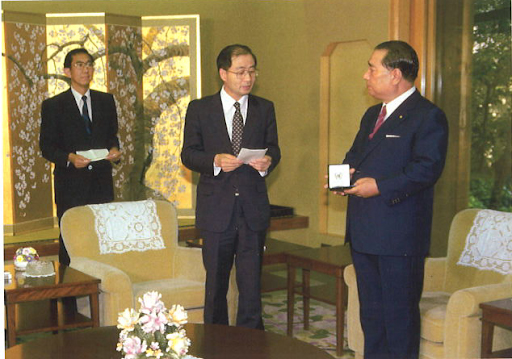At the heart of Soka humanism lies the ideal of the sanctity of life and the empowerment of the individual. War, environmental degradation, poverty and nuclear armament strip away the rights and dignity of the individual.
Daisaku Ikeda’s commitment to peace grows from his experience as a young teenager of World War II. His interactions with second Soka Gakkai president Josei Toda in the aftermath of the war helped shape his anti war sentiments into a philosophy that supports a multifaceted peace movement. What sustains Ikeda’s energetic engagement is his belief in the sanctity of life and the creative potential of individual human beings, and his faith in the power of dialogue to bridge the distances between people.
For Ikeda, peace is far more than the mere absence of war. Rather, it points to a set of conditions in which cultural differences are embraced and appreciated and in which dialogue is firmly established as the means of choice for resolving conflict. In recent years, the idea of a “culture of peace” has gained widespread currency in the world. From his writings and actions, it is clear that Ikeda has been a pioneering practitioner of this concept.
Since 1983, every year, Ikeda authors a peace proposal which explores the interrelation between core humanistic concepts and the diverse challenges global society faces in the effort to realize peace and human security. In addition, he has also made proposals touching on issues such as education reform, the environment, and the United Nations.
A unique feature of the Peace Proposals is that they emphasize the importance and role of individual action in resolving global issues.
A central and consistent focus of these proposals has been on ways of revitalizing and strengthening the role of the UN.
“Humanity faces a range of complex issues that show no regard for national borders–threats such as terrorism, armed conflict, poverty, environmental degradation, hunger and disease. A reformed and strengthened UN is essential to mustering effective responses to the global challenges of the new era.”
Daisaku Ikeda

UN Under-Secretary-General, Yasushi Akashi awarded Ikeda the United Nations Peace Award. August 1983
Ikeda himself has held dialogues with Secretary Generals Kurt Waldheim, Javier Peréz de Cuellar and Boutros Boutros-Ghali, and is recipient of the United Nations Peace Medal and the UNHCR Humanitarian Award.
In August 2006, the SGI President met with UN Under-Secretary-General Anwarul K. Chowdhury and presented a proposal entitled “Fulfilling the Mission: Empowering the UN to live up to the world’s expectations.”
Annual Peace Proposals
- Transforming Human History: The Light of Peace and Dignity (2022)
- Value Creation in a Time of Crisis (2021)
- Toward Our Shared Future: Constructing and Era of Human Solidarity (2020)
- Toward an Era of Human Rights: Building a People’s Movement (2018)
- The Global Solidarity of Youth: Ushering In a New Era of Hope (2017)
- Universal Respect for Human Dignity: The Great Path to Peace (2016)
- A Shared Pledge for a More Humane Future: To Eliminate Misery from the Earth (2015)
- Value Creation for Global Change: Building Resilient and Sustainable Societies (2014)
- Compassion, Wisdom and Courage: Building a Global Society of Peace and Creative Coexistence (2013)
- Human Security and Sustainability: Sharing Reverence for the Dignity of Life (2012)
- Toward a World of Dignity for All: The Triumph of the Creative Life (2011)
- Toward a New Era of Value Creation (2010)
- Toward Humanitarian Competition: A New Current in History (2009)
- Humanizing Religion, Creating Peace (2008)
- Restoring the Human Connection: The First Step to Global Peace (2007)
- A New Era of the People: Forging a Global Network of Robust Individuals (2006)
- Toward a New Era of Dialogue: Humanism Explored (2005)
- Inner Transformation: Creating a Global Groundswell for Peace (2004)
- A Global Ethic of Coexistence: Toward a “Life-Sized” Paradigm for Our Age (2003)
- The Humanism of the Middle Way: Dawn of a Global Civilization (2002)
- Creating and Sustaining a Century of Life: Challenges for a New Era (2001)
- Peace through Dialogue: A Time to Talk Challenges for a New Era (2000)





